Swimming pool hardness can destroy your pool and its components. Avoid this through proper balance of your pool chemistry.
Hard water is the bane of every swimming pool owner from here to Timbuktu. It can cause thousands of dollars in damage to both the pool and its components.
That’s why you must nip this problem in the bud before it has a chance to wreak havoc.
Although calcium is terrific for the human body because it makes for healthy bones and teeth, it’s not so good when it comes to your pool. Over time, your pool water can become oversaturated with this mineral.
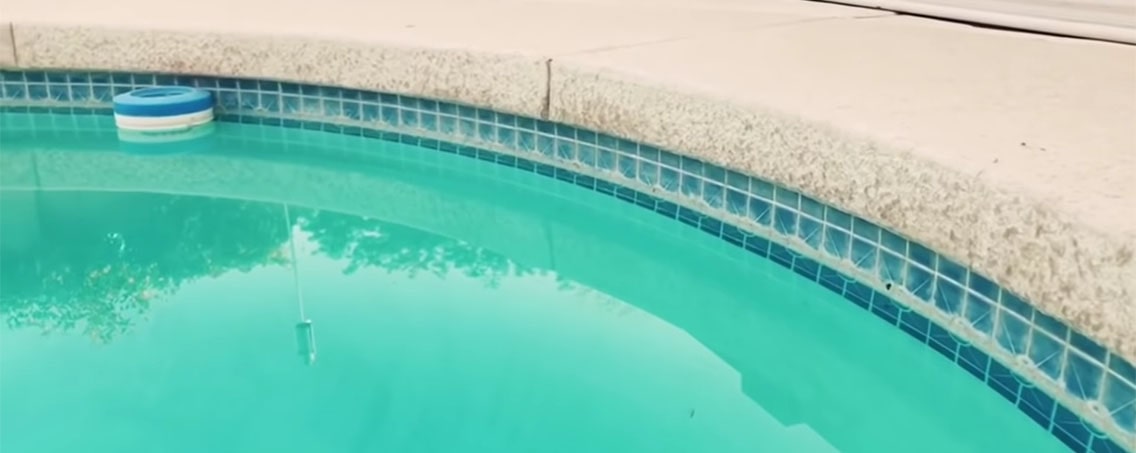
When this happens, you have a case of hard water on your hands. Hard water means there are too many minerals in your water supply—including calcium. Any water with a calcium content over 300 PPM (parts per million) is considered hard.
Calcium in hard water causes damage by blocking the flow of water in and out of your pool. If left unaddressed for too long, you may even notice an unsightly buildup of calcium sediment on pool surfaces.
Soft Water
You not only have to worry about too much calcium in your water, but not enough.
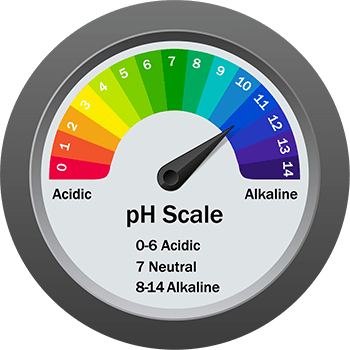
This condition is known as soft water. Soft water has a calcium hardness of less than 100 PPM. It can pull calcium out of tile grouting and concrete, leading to disintegration and massive amounts of money being hoovered out of your wallet to pay for replacement costs.
Here’s why that happens: water has an innate need to be balanced. If your pool water doesn’t have sufficient amounts of calcium, the water will try to maintain balance by drawing calcium from wherever it can find it.
In concrete pools, it’ll attack the material from which the pool is manufactured. In fiberglass or vinyl pools, the water will leach calcium from metal fittings and heat exchangers.
This will cause corrosion that can destroy the components.
Once damage from soft water occurs, there’s no way to undo it. The only way to fix the damage done is to replace or resurface the damaged part. That’s why it’s crucial not to let your pool’s calcium hardness dip too far below 150 PPM.
Like everything else in life, the key is balance.
Hard Water Signs
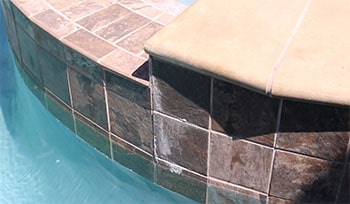
If your pool water is cloudy, this might be an indication of too much calcium.
However, cloudy water can be caused by other things too. Try first treating it with water clarifier or pool shock.
If the cloudiness doesn’t dissipate after trying this a couple of times, there’s too much calcium. You’re going to need to try something else.
Decreasing Hardness
If you have hard water, here’s what you need to do to lower your calcium levels:
Test Your Water Source
Use a strip or chemical test to check the calcium levels in your pool, which you can buy from a pool center or home improvement store.
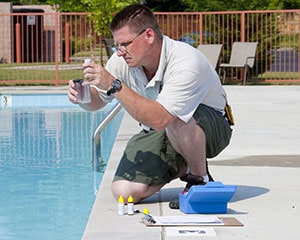
Grab some water from the pool, and add the chemicals or test strip. Then, wait for the strip or the water to change colors and match the color to the label on the kit’s packaging. The calcium hardness should be around 250-350 parts per million (PPM). If the hardness is above 350 PPM, you’ll need to lower it.
Some areas have very high levels of calcium in the public water supply, which causes higher calcium levels in your pool. Say calcium levels in your pool water are routinely higher than 350 PPM. In that case, you need to immediately test your tap water for hardness.
If the calcium levels are high, you’re going to need a garden hose filter to reduce the amount of calcium that gets deposited into your pool.
Otherwise, you’ll be fighting a losing battle.
You also need to test the alkalinity, pH, and chlorine levels because changes in them can indicate calcium hardness.
In general, the pH should be between 7.2 and 7.4.
Chlorine levels should be between one and three PPM.
The alkalinity level should be between 80 and 120. For pools with calcium hardness issues, try to keep the alkalinity level as close to 80 as possible.
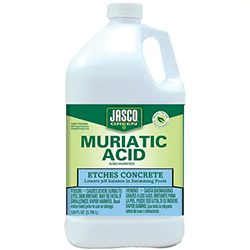
Add Muriatic Acid
You can control calcium hardness by adding muriatic acid to lower water alkalinity.
Add two to three capfuls of muriatic acid to lower the alkalinity to around 80.
Be sure to wait at least 12 hours before testing the alkalinity again.
Try Pool Flocculant
Pool flocculant is a compound that causes calcium to form into large clumps and then sinks to the bottom. Once this happens, suck it up with a pool vacuum.
Keep in mind that flocculant won’t remove calcium that’s already dissolved in the water. It’s only effective with calcium solids that aren’t already dissolved.
You must turn your pump and filter off before adding floc. You don’t want floc to get into your filter, or you’re going to need to replace the filter medium.
Drain Your Pool
If you live in a hard water area, consider draining your pool once or twice a year and fill it with softer water. You can buy water with the perfect chemical balance, but this tends to be expensive, costing around $250 per 5,000 gallons.
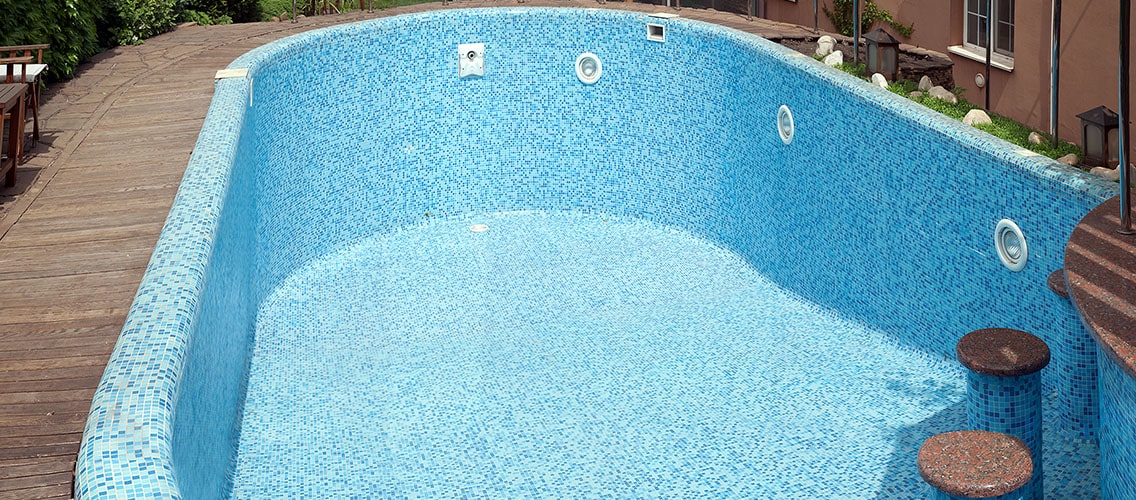
However, it’s a fast and easy way to refill your pool with softer water.
There are companies who come to your house with a truck to run your hard water through a reverse osmosis filter system. Within an hour or two, you’ll have softer water you can use in your pool.
If Levels are Too Low
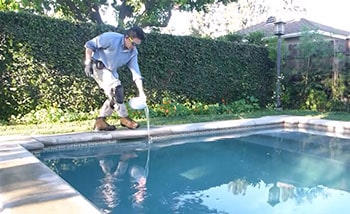
As was already mentioned, low calcium levels can be just as bad as high levels because they can corrode your pool and pool equipment.
Fortunately, increasing hardness levels is a whole lot easier than lowering them. The best remedy for soft water is to add something called “calcium hardness increaser,” which is calcium chloride in granular form.
To know how much to add, you’ll need to know your pool volume. You’ve got to be careful because when calcium chloride comes into contact with water, it releases heat in an exothermic reaction.
That’s why you need to wear protective gear when doing this sort of thing.
Removing Calcium Buildup
If you want to remove unsightly calcium buildup in your pool, use a pumice stone on plaster surfaces.
For tile, use vinegar and a scrub brush.
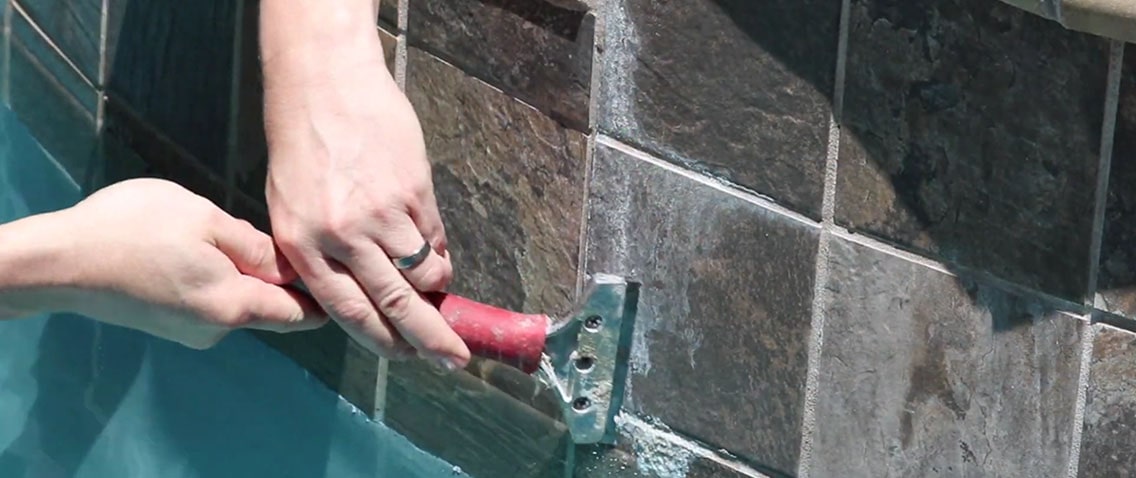
Final Thoughts
When it comes to pool maintenance, you cannot slack off and expect things to be okay.
The longer you procrastinate about bringing your pool chemistry into balance, the more likely it is that hard water problems will cause massive headaches for you.
That’s why you need to regularly monitor your water to make sure the chemistry is perfectly balanced.
If it isn’t and your pool water is over or undersaturated with calcium, you need to take the actions in this article to restore equilibrium.
Good luck, and happy swimming!

Pool Maintenance Tips & Tricks
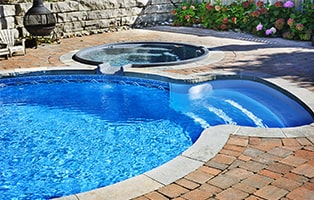

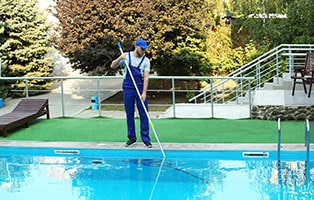
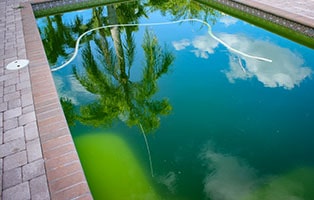
My vinyl above ground pool has hard cement like buildup and the pump filter completely plugged up with a coating of cement. I feel the sand filter may be just as bad. Can I poor a gallon of muratic acid in the sand filter, let it soak and then backwash? The pool was filled with soft water but my soft water unit quit working for a year and added water at extremely high hard water. I live in hot, sunny Arizona. Thanks